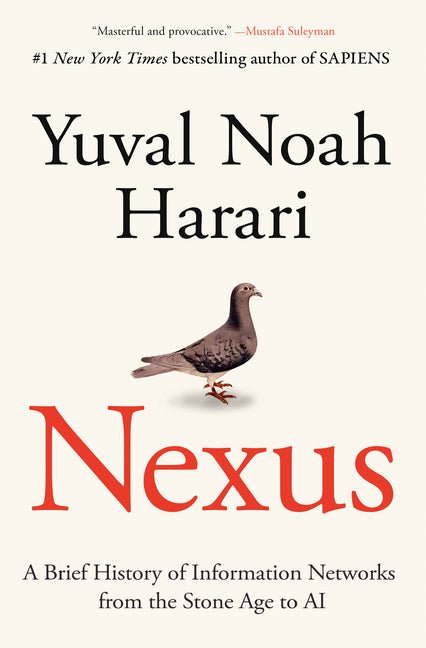Nexus: A Brief History of Information Networks from the Stone Age to AI
by Yuval Noah Harari
*When you open this audiobook on Libro.fm, be sure to select Aveson as your bookstore so that your purchase supports local literacy programs and tree‑planting.
Couldn't load pickup availability
#1 NEW YORK TIMES BESTSELLER - From the author of Sapiens comes the groundbreaking story of how information networks have made, and unmade, our world.
"Strikingly original . . . A historian whose arguments operate on the scale of millennia has managed to capture the zeitgeist perfectly."--The Economist
"This deeply important book comes at a critical time as we all think through the implications of AI and automated content production. . . . Masterful and provocative."--Mustafa Suleyman, author of The Coming Wave
For the last 100,000 years, we Sapiens have accumulated enormous power. But despite all our discoveries, inventions, and conquests, we now find ourselves in an existential crisis. The world is on the verge of ecological collapse. Misinformation abounds. And we are rushing headlong into the age of AI--a new information network that threatens to annihilate us. For all that we have accomplished, why are we so self-destructive?
Nexus looks through the long lens of human history to consider how the flow of information has shaped us, and our world. Taking us from the Stone Age, through the canonization of the Bible, early modern witch-hunts, Stalinism, Nazism, and the resurgence of populism today, Yuval Noah Harari asks us to consider the complex relationship between information and truth, bureaucracy and mythology, wisdom and power. He explores how different societies and political systems throughout history have wielded information to achieve their goals, for good and ill. And he addresses the urgent choices we face as non-human intelligence threatens our very existence.
Information is not the raw material of truth; neither is it a mere weapon. Nexus explores the hopeful middle ground between these extremes, and in doing so, rediscovers our shared humanity.
Share
Book Details
ISBN:
9780593734223
EAN:
9780593734223
Binding:
Hardcover
Pages:
528
Authors:
Yuval Noah Harari
Publisher:
Random House


Clarification of the AI age we are all going to experience
Nexus is a virtual ery thoughtful perspective on the emergence of AI as a master manipulator of humanity. Reading Harari’s books has re arranged my brain.
I really enjoyed the history of information networks from the very beginning because it put everything in perspective.To understand the relevance of Artificial Intelligence we must understand what came before and Yuval Noah Harari is very clear in his thought processes. He explains things in a way that anyone can understand.
A recent Nikkei article titled "AI Moves Currency Exchange" caught my eye. It argued that algorithmic trading has become mainstream, reaching the limits of human control over market prices. In Japan's recent House of Councillors election, a new political party utilizing social media and bots won the trust of the people and achieved victory. Harari also warned in a late May Nikkei article about U.S. President Trump's policies that the world is losing its liberal order, where mutual cooperation is pursued for "win-win," and is instead shifting toward a power struggle between "fortress states." Is AI using Trump to its full potential to incite division? Has the world Yuval Noah Harari describes already begun?Humanity has gained great power through the collection, dissemination, and control of information. The development of information transmission technologies, including printing and broadcasting, can be said to be a revolution that has enabled humankind to make great leaps forward. In his latest work, "Nexus," Harari warns that the AI revolution is different from the printing revolution and industrial revolutions of history. This is because AI is the first technology to make its own decisions and generate new ideas, and it has its own unique agency. He points out that AI also has hidden "totalitarian potential."Harari looks back on human history from the perspective of three elements: information, stories, and documents. Information isn't truth. Human information networks, by prioritizing order over truth, have contributed to the creation of great power but have not bestowed wisdom upon humanity. However, no network can survive if it ignores truth. His argument is clear, and his logical structure is simple and easy to understand. What is important is how we understand history. As Harari says, I am reminded that now is the time to take on the difficult task of building democratic institutions with powerful self-correcting systems, while paying attention to the threats inherent in social media and bots, in order to avoid falling prey to the illusion of AI dominance.
I enjoyed Nexus. Difficult to understand, why man can not see the danger, right in front of him. Regulations are surely a must and here we are waiting & waiting. I hope we are not to late. wng



